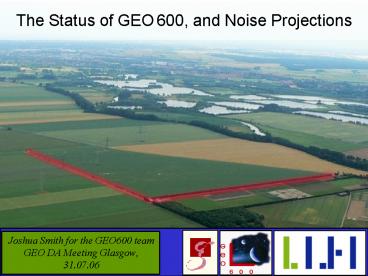The Status of GEO 600, and Noise Projections - PowerPoint PPT Presentation
1 / 44
Title:
The Status of GEO 600, and Noise Projections
Description:
90% of relocks succeed without manual intervention ... The next factor might involve improving signal-recycling FB, laser power noise. ... – PowerPoint PPT presentation
Number of Views:39
Avg rating:3.0/5.0
Title: The Status of GEO 600, and Noise Projections
1
The Status of GEO 600, and Noise Projections
- Joshua Smith for the GEO600 team GEO DA Meeting
Glasgow, 31.07.06
2
GEO 600 simplified optical layout
600m
Optics suspended as double or triple pendulums
3
Prototype for future detectors configuration
4
Theoretical sensitivity limit
5
Theoretical limit vs. detuning
6
Sensitivity development 02-06
3000x better _at_ 500Hz in 4 years
7
Sensitivity in runs and theoretical sensitivity
www.geo600.uni-hannover.de/geocurves
8
Laser-IFO network sensitivity
Most recent publicly available (from pages like
the one just shown) curves for each project
9
Laser IFOs theoretical limits
Most recent publicly available curves for each
project
10
GEO 600 in S5 Night and Weekend
- S5 Night and Weekend
- Jan 20 May 1
- Commissioning during normal working hours,
running for all other times. - Commissioning focused on increasing sensitivity
and locking stability - Changes to the detector occurred quite often
many different epochs for noise, couplings, etc. - Signal detuning changed from 350Hz to 550Hz on
April 18th
11
Tuning to 550Hz
Decision made to increase science output above
400Hz, at cost of increased noise below.
Effective after April 18th.
12
Night and weekend cumulative statistics
From GEO600 DC pages talk by Hewitson
13
GEO 600 in S5 24/7 Mode
- S5 Night and Weekend
- started May 2, ongoing...
- A few maintenance periods for measurements and
glitch removal - Focus shifts to data quality see talks by Hild
and Smith - Detector stable, with high duty cycle.
- Signal detuning fixed at 550Hz.
- Power increased just prior to 24/7
14
24/7 mode cumulative statistics
15
Locking performance
Number of unlocked times
Unlocked time minutes
- Typical relock-time 5 minutes
- Relocking completely automated
- gt90 of relocks succeed without manual
intervention - Longest unlocked time 19 hours (hardware failure)
16
GEO Summary Pages
http//www.geo600.uni-hannover.de/georeports/group
s/georeports.html
17
HACR History 24/7
May
June
July
18
S5 24/7 vs. S5 Night and Weekend
After turning up power, glitch removal work,
better than or equal to NW at all freqs (for
good time)
19
Peak sensitivity BLRMS
- Instrumental duty-cycle gt 90
- Peak RMS strain sensitivity hRMS 2.510-22
June 96 duty cycle
- More frequent interruptions of lock in July due
to local construction work
20
Detector output I
transfer function
detector output
noise source
detector output
21
Detector output II
transfer function
detector output
noise source
detector output
22
Detector output III
transfer function
detector output
noise source
detector output
23
Noise channels
noise channel
transfer function
detector output
noise source
detector output
24
Noise projections
noise channel
transfer function
detector output
noise source
detector output
noise projections
noise budget
25
Simplified procedure I
Causality key
- Notes
- Causality key
- Simultaneous DFTs allow comparison
- Other variants exist, eg open-loop which requires
CLTF
26
Simplified procedure II
Causality key
Normal operation
27
Simplified procedure III
Causality key
Normal operation
28
Noise projection alignment FB
? feedback
noise projection
transfer function
29
Noise projection laser frequency noise
? Transfer function calculation would require
very sophisticated model
Noise projections well-suited for very
complicated systems
30
Noise removal, eg., frequency noise
Most important role of NPs in commissioning
Identify limiting noise sources team removes
them
31
Noise budget for S5
32
Noise removal possibilities
- Below 100Hz, factor 3-5 could be gained from work
on alignment loops. - The next factor might involve improving
signal-recycling FB, laser power noise. - Shot noise limit at high freqs
- Find power-up glitches, turn up power
- Open vacuum and find additional losses??
- Intermediate frequencies search for sources of
up-conversion - Scattering in North building causing (some)
ripples - Have developed useful techniques for finding
scattering outside vacuum system - Evidence of up-conversion in H
33
Vetoes of false gravitational waves
- Vetoes crucial for burst search
- Noise channels contain almost no GW info
- Coincident (within windows) events are not GWs !
Example injected burst-like waveform
See talk by P. Ajith
34
Noise subtraction alignment FB
Error at a given freq. vs. filter accuracy
H
H
Results of a time-domain subtraction
35
Outlook
- Run in 24/7 mode until October.
- Decide then how to continue (2 choices?)
- Commissioning break to increase sensitivity
- Continue full-time data taking
- Input from search groups welcome what impact can
GEO data make?
36
The End
37
Automation
Goal Noise projections (full budget) at any time.
- Transfer functions
- Measure occasionally and
- If dynamic, must be tracked
- 2. Fourier transforms of Nj and H
- Signals recorded continuously anyway
38
Tracking transfer functions
- At calibration line, projection and H should have
same amplitude, phase. - Ratio and difference indicate TF accuracy.
- For 10 day test, about 10 10o
39
Calibration lines
40
Prototype for future detectors suspensions
- Triple pendulum suspensions
- provide f-6 filtering of seismic noise above
resonances. - Quasi-monolithic fused silica
- Removed interfaces where possible
- Expect very low thermal noise due to high quality
factor materials
41
Limitations loop gain
Single-path loop
Simulated results
Workarounds exist eg., for high loop gain
42
Limitations II
Single-path loop
Split-path loop
Workarounds exist eg., for high loop gain
43
Noise projection (de)modulation phase
Works well for very complicated systems
44
H vs signal recycling FB































